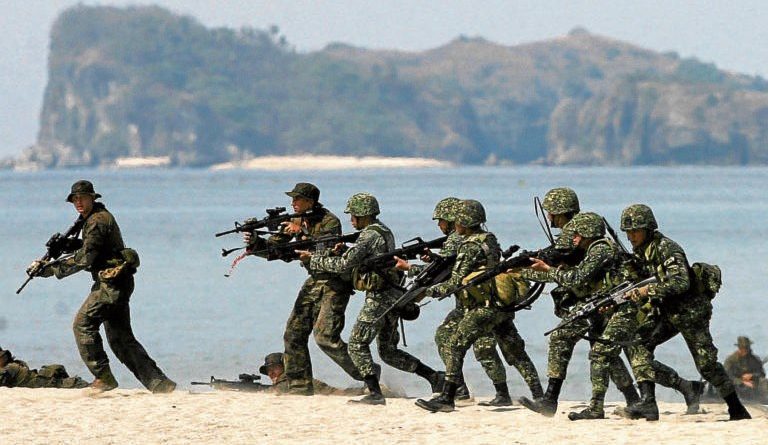HEADLINE | Philippines (PH) and the United States (US) set course for defense alliance
.
.
.

THE Philippines and the United States will set the long-term direction of their security and defense alliance with the holding of the Two-Plus-Two (2+2) Ministerial Dialogue in Washington, D.C. next week.
The high-level meeting between the Defense and Foreign Ministers of the US and the Philippine governments will be held on Tuesday, April 11, Senior Undersecretary Carlito Galvez Jr., Department of National Defense officer in charge, said on Tuesday during The Manila Times roundtable.
Foreign Affairs Secretary Enrique Manalo will meet with his American counterpart US Secretary of State Antony Blinken, while Galvez will have a bilateral dialogue with US Secretary of Defense Lloyd Austin 3rd.
“For a long time, we suspended the 2+2 dialogue. This will be the third such meeting after seven years with the first two held during the administration of President [Benigno] Aquino 3rd,” Galvez said.
He added that the 2+2 will set the direction of the Mutual Defense Board-Security Engagement Board (MDB-SEB), which coordinates a framework for defense and security cooperation between the US and the Philippines.
Galvez said the MDB-SEB will line up all the joint activities that will be undertaken by the US and the Philippines including joint maritime patrols, inter-service training with coast guards and navies and people-to-people engagement, among others.
“There are hundreds of activities that we have to line up every year and the 2+2 dialogue will be the one that will set the direction,” the Defense OIC added.
“We are now setting a long-term direction, meaning for this administration until 2028. We really need to line up our activities,” he said.
The first dialogue will be hosted by the US State Department to be followed by a bilateral meeting with the Defense ministers.
“It is a very significant meeting because we were able to regain our relationship with the US and we were able to collectively design our future engagement,” Galvez said.
Quoting Austin, he said the dialogue is a huge step toward “modernizing” the US-Philippine alliance.
“We will elevate our alliance to a higher position, wherein we can have that kind of collective, mutual interest,” he added.
Austin had said the full range of US-Philippine maritime cooperation will also be reviewed during the 2+2 Ministerial Dialogue.
Galvez said talking points are “very important” in terms of discussing the current security arrangements between the Philippines and the US and also their future coalition with Japan and also Australia.
The Philippines already expressed support for Aukus, a trilateral security pact among Australia, the United Kingdom and the US.
“We are one of the countries that will support the Aukus,” Galvez said. “What is good for our allies is also good for us.”
Under the pact, which will focus on military capability, the US and the UK will assist Australia in acquiring nuclear-powered submarines.
The pact also includes cooperation on advanced cyber mechanisms, artificial intelligence and autonomy, quantum technologies, undersea capabilities, hypersonic and counter-hypersonic, electronic warfare, innovation and information sharing.
The holding of the 2+2 dialogue is synchronized with the opening of the 38th iteration of bilateral US-Philippine Balikatan (shoulder-to-shoulder) exercises.
“Both the start of the dialogue and the opening of the Balikatan will happen on the same day, April 11,” Galvez said.
Balikatan exercises are annual war games between the Armed Forces of the Philippines (AFP) and the US Armed Forces’ Indo-Pacific Command geared at enhancing both forces’ interoperability.
The 2023 iteration of Balikatan is projected to include field training exercises composed of combined and live fire exercises and military operations in urban terrain.
Galvez said Balikatan 38-2023 Balikatan will be the largest ever iteration of the Philippine-led annual exercises with a total of 12,000 US military personnel, 5,000 members of the AFP and also 11 Australian forces.
“This is the first time that Australia is getting involved in the Balikatan,” he added.
Dozens of foreign military observers including from seven Asean member countries will also be part of the exercises, Galvez said.
“In the future, other allied countries can join the exercises, especially the navy-to-navy and air force-to-air force engagements,” he added
 Ads by: Memento Maxima Digital Marketing
Ads by: Memento Maxima Digital Marketing
@[email protected]
SPACE RESERVE FOR ADVERTISTMENT


 Memento Maxima Digital Marketing
Memento Maxima Digital Marketing






